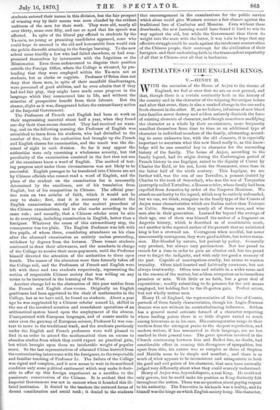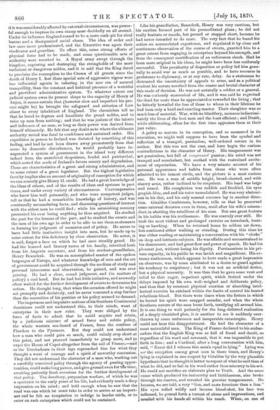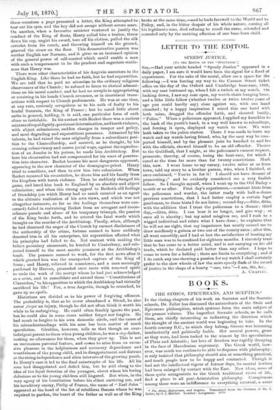the accession of the House of Anjou to the throne
of had had fair play, they might have made some progress in the
language which they commenced late in life, and without the that, though there is a certain continuity both in the history of stimulus of prospective benefit from their labours. But the the country and in the character of the reigning Sovereigns before chance, slight as it was, disappeared before the extraordinary action and after that event, there is also a marked change in the one and a
of the Imperial Government. fresh element in the other. If, as we believe, infusions of new blood terms to be instructed in the learning of the West. promises or acts. With little or no faith, but a great deal of Another change led to the abstraction of this poor residue from superstition ; readily submitting to do penance for the evil means the French and English class-rooms. Originally an English employed, but holding fast to the ill-gotten gain. Perfect actors, gentleman had been appointed to the chair of mathematics in the but not wholly untrue men.
College, but as we have said, he found no students. About a year Henry II. of England, the representative of this line of Counts, ago he was supplanted by a Chinese scholar named Li, skilled in partook of these family characteristics, though his Anglo-Norman the use of the involved notation and roundabout operations of an descent was not without its counterbalancing influences. Seldom arithmetical system based upon the employment of the abacus. has a general moral estimate formed of a character respecting
if it was considerably affected by external circumstances, was power- ful enough to impress its own stamp most decidedly on all around. Under its influence England ceased to be a mere cock-pit for rival barons and a disorganized social chaos. The idea of order and law once more predominated, and the Executive was again their vindicator and guardian. To effect this, some strong efforts of physical force had to be made, and some questionable acts of authority were resorted to. A Royal army swept through the kingdom, capturing and destroying the strongholds of the most turbulent or dangerous nobles, and it is said that the King dared to proclaim the resumption to the Crown of all grants since the death of Henry I. but these special acts of aggressive vigour were less influential agents in ushering in the new era of assured tranquillity, than the constant and habitual presence of a watchful and provident administrative system. To whatever extent our judicial system owes its present shape to the sagacity of Henry of Anjou, it seems certain that (however slow and imperfect his pro- cess might be) he brought the safeguard and criterion of Law closer to every inhabitant of England. The chroniclers tell us that he loved to depress and humiliate the proud nobles, and to raise up men from nothing ; and that be was jealous of the talents and influence of no men, so long as their power was derived from himself ultimately. He felt that any doubt as to where the ultimate authority rested was fatal to confidence and sustained order. His expedition in person to Ireland was dictated by something of this feeling, and had he not been drawn away prematurely from that scene by domestic disturbances, he would probably have in- augurated a system of government in the island very different indeed from the anarchical despotisms, feudal and patriarchal, which sowed the seeds of Ireland's future misery and degradation. These are characteristics of a great and strong administrator, and to some extent of a great legislator. But the highest legislative faculty implies also an amount of originality of conception for which we can scarcely give Henry II. credit. He had a great knowledge of the ideas of others, and of the results of ideas and systems in past times, and under every variety of circumstances. Contemporaries who knew him well personally, and who were competent judges, tell us that he had a remarkable knowledge of history, and was continually accumulating facts, and discussing questions of interest with the ablest men he could find ; while his astonishing memory prevented his ever losing anything he thus acquired. He studied the past for the lessons of the past, and he studied the events and the men of his own age in order to be able to use them as elements in forming his judgment of measures and of policy. He seems to have had little instinctive insight into men, but he made up to some extent for this deficiency by close observation. He never, it is said, forgot a face on which he had once steadily gazed. He had the learned and literary tastes of his family, inherited both from his Angevin ancestors, and from his student-grandfather, Henry Beauclerk. He was an accomplished master of the spoken languages of Europe, and whatever knowledge of men and the art of government could be acquired through the medium of study and personal intercourse and observation, he gained, and was ever gaining. Ile had a clear, sound judgment, and (in matters of policy) a cool head. But he had but little initiative, and avowedly often waited for the further development of events to determine his action. He thought long, that when the occasion offered he might act promptly and decisively, and he never ventured a step further than the necessities of his position or his policy seemed to demand.
The impetuous and impulsive nations of his Southern Continental dominions could not understand this, to their minds, want of enterprise in their new ruler. They were obliged by the force of facts to admit that he could acquire and retain, by a judicious mixture of armed force and subtle policy, the whole western sea-board of France, from the confines of Flanders to the Pyrenees. But they could not understand how a man who could gain so much, could calmly stop short at this point, and not proceed immediately to grasp more, and to expel the House of Capet altogether from the soil of France,—and so the Troubadours in their lays reproached him for what they thought a want of courage and a spirit of unworthy concession. They did not understand the character of a man who, working out a carefully conceived policy through the agency of passing oppor- tunities, could make long pauses, and give ground even for the time, awaiting patiently fresh occasions for the further development of that policy. The desultory, purposeless warfare, of which he was a spectator in the early years of his life, had evidently made a deep impression on his mind ; and bold enough when he saw that the road was one which he must take in order to arrive at an import- ant end he felt no temptation to indulge in border raids, or to enter on rash enterprises which could not be sustained. Like his grandfather, Beauclerk, Henry was very cautious, but his caution formed part of his premeditated plans ; he did not really hesitate or recede, but paused or stopped short, because he had never intended to do more. The very fact that he based his action on accumulated experience, and regulated it by close and continuous observation of the course of events, guarded him to a great extent from engaging in enterprises beyond his strength, and from the consequent mortification of an unforeseen check. Had he been more original in his ideas, he might have been less uniformly successful. This peculiarity of disposition or policy led him gene- rally to avoid war as much as possible, and to have recourse in preference to diplomacy, or at any rate, delay. As a statesman he distrusted the uncertainty of appeals to arms, and as a political student his nature revolted from the coarse and brutal character of this mode of decision. He was not naturally a soldier or a general. He was curiously economical of life, and it was said he regretted the dead far more than he appreciated or rewarded the living ; that he bitterly bewailed the loss of those to whom in their lifetime he had been only a hard and exacting master. Their slaughter was so much loss of material. War, with its blind fury, menaces indiscrimi- nately the lives of the best men and the least efficient ; and Death, while obliterating, often for the first time appraises them at their just value.
A policy so mature in its conception, and so measured in its execution, we might well suppose to have been the symbol and reflection of a tranquil, passionless, well-ordered nature in its author. But this was not the case, and here begin the curious contradictions in the character of Henry. His temperament was got passionless, but full of compressed passion ; his mind was not tranquil and nonchalant, but seethed with the restrained excite- ment of expectation. We have a very minute account of his personal appearance and habits from those who were often admitted to his inmost circle, and the picture is a most curious one. He was a man of middle height, broad-chested, and with sinewy arms, rather inclined to be corpulent. His head was large and round. His complexion was reddish and freckled, his eyes greyish-blue, and and his voice unmodulated. He was very abstemi- ous in his diet, and his only sensual excesses lay in another direc- tion. Giraldus Cambrensis, however, tells us that he preserved some external decorum even in these, until after his wife's miscon- duct in abetting the rebellions of his sons. But one great feature in his habits was his restlessness. He was scarcely ever still. He took the most violent and prolonged exercise on horseback, hunt- ing or hawking. When he returned home he seldom sat down, but continued either walking or standing. During this time he was either reading or maintaining a conversation with his "clerks" on deep and intricate subjects. He was affable and unconstrained in his demeanour, and had great flow and power of speech. He had his pleasant jest, without losing his dignity. Parsimonious in his pri- vate capacity, in his public he was lavish and magnificent. His ex- treme restlessness, which appears to have made a great impression on observers, was by some attributed to a desire to guard against his tendency to corpulency ; but it was not an artificial device, but a physical necessity. It was thus that he gave some vent and relief to that eager, impatient spirit, which fretted under the delays imposed by his own well-weighed and deliberate policy, and thus that by constant physical exertion or absorbing intel- lectual exercise he subdued within the limits of control his heatedi rebellious blood. But there were times when the fetters in which he bound his spirit were snapped asunder, and when the whole Southern nature of the man buret forth, terrifying all around him. It is one thing to wait patiently for the long-deferred realization of a deeply.cherished plan, it is another to see it suddenly over- thrown by some unforeseen and insuperable catastrophe. Henry could not bear this disappointment. He had the character of a most untruthful man. The King of France declared to his ambas- sadors that the English King was so full of fraud and deceit, so regardless of his word and covenant, that it was impossible to put faith in him ; and a Cardinal, after a long conversation with him, said, " Never did I witness this man's equal in lying." Lying was not the exception among great men in those times, and Henry's lying is explained in one respect by Giraldus by the very plausible hypothesis that be thought it better to repent of what he said than of what he did, and to fail in his word rather than miscarry in his act. He could not sacrifice an elaborate plan to Truth. And the same cause which produced his insincerity and faithlessness, also broke through his reserve, and revealed his genuine temperament. He became, we are told, a very "lion, and more ferocious than a lion." His eyes rolled wildly and became blood-shot, his face was inflamed, he poured forth a torrent of abuse and imprecations, and assailed with his hands all within his reach. When, on one of
these occasions a page presented a letter, the King attempted to tear out his eyes, and the boy did not escape without severe scars. On another, when a favourite minister ventured to justify the conduct of the King of Scots, Henry called him a traitor, threw down his cap, ungirt his sword, tore off his clothes, pulled the silk coverlet from his couch, and throwing himself on the ground, gnawed the straw on the floor. This demonstrative passion was neither English nor Norman, and it gives us an increased opinion of the general power of sell-control which could enable a man with such a temperament to be the prudent and sagacious states- man that Henry was.
There were other characteristics of his Angevin ancestors in the English King. Like them he had no faith, but he had superstition. We are told that he paid no Went* to the ordinary religious observances of the Church ; he refused to listen to clerical admoni- tions on his moral conduct., and he had no scruple in appropriating or retaining in his hands Church revenues, or in siuioniacal trans- actions with respect to Church preferments. He was at one time, at any rate, curiously scrupulous as to his oath of fealty to his feudal Suzerain, the King of France ; but he cared little about oaths in general, holding, it is said, one particular form of oath alone as inviolable. In his contest with Becket there was a curious mixture of royaldignity, persistent determination, and harsh violence, with abject submissions, sudden changes in temper and policy, and most degrading and superstitious penances. Attracted by his talents, he had raised the man originally from a subordinate posi- tion to the Chancellorship, and assured, as he thought, by his seeming subserviency and coarse jovial ways, against the reproduc- tion of an Anselin in his person, he made him Archbishop. But here his observation had not compensated for his want of penetra- tion into character. Becket became his most dangerous opponent, appearing in the new character of the demagogue-priest. Henry tried to conciliate, and then to cow him into submission. When Becket recanted his recantation, he drove him and his family from the kingdom with harsh violence. Then he suddenly changed his game, and lured him back to England by an absolute and abject submission; and when this strong appeal to Beckeas old feelings of friendship (on which Henry had so much counted as an agent in the ultimate realization of his own views, and which was not altogether insincere, so far as the feelings themselves were con- cerned) failed in restraining Becket from an arrogant and incon- siderate parade and abuse of his temporary triumph, the passion of the King broke forth, and he uttered the fatal words which brought on the murder of the Archbishop. Finally, when, although he had disarmed the anger of the Church by earnest disclaimers of the authorship of the crime, fortune seemed to have suddenly deserted him in all his enterprises, his superstition effected what his principles had failed to do. Not content with making the fullest pecuniary atonement, he hurried to Canterbury, and sub- jected himself to the most ascetic penances at the Archbishop's tomb. The penance seemed to work, for the first news after it which greeted him was the unexpected capture of the King of Scots ; and Henry, relieved in conscience, and a man seemingly pardoned by Heaven, proceeded once more with renewed spirit to undo the work of the martyr whom he had just acknowledged as a saint, and to consolidate and extend those " Constitutions of Clarendon," to his opposition to which the Archbishop had virtually sacrificed his life ! For, a true Angevin, though he crouched, he gave up no spoils.
Historians are divided as to his power of forgiving offences. The probability is, that as he never abandoned a friend, he also never forgot an injury, though he did not often think it worth his while to be unforgiving. He could often frankly ignore the past, but he could also in some cases neither forget nor forgive. He had much to forgive in his own domestic circle, and the cause of his misunderstandings with his sons has been matter of much
speculation. Giraldus, however, tells us that though an over- indulgent parent to them when young children, he was a step-father, making no allowances for them, when they grew up. This is not an uncommon parental feature, and seems to arise from an exces- sive pleasure in the helplessness and necessary dependence and trustfulness of the young child, and in disappointment and distrust at the rising independence and alien interests of the growing youth. In Henry's case it led to the final catastrophe of his life. All his sons had disappointed and defied him, but he still clung to the idea of the loyal devotion of the youngest, about whom his loving delusions as to his young children still lingered. But when, in the very agony of his humiliation before his eldest surviving son, and his hereditary enemy, Philip of France, the name of " Earl John " appeared at the head of the list of rebellions Barons whom he was reauired to pardon, the heart of the father as well as of the King broke at the same time,—and he bade farewell to the World and to Policy, and, in the bitter despair of his whole nature, cursing all his legitimate sons, died refusing to recall the curse, attended and consoled only by the untiring affection of one base-born child.
































 Previous page
Previous page